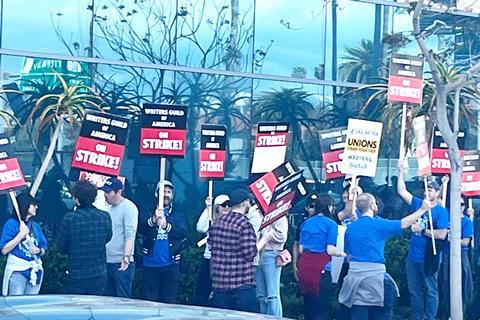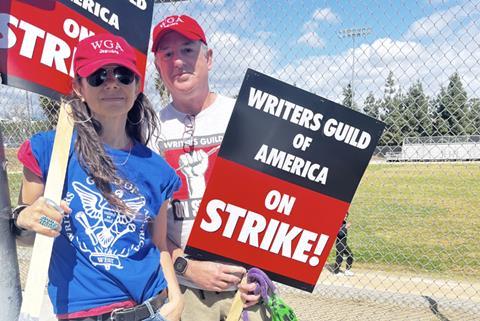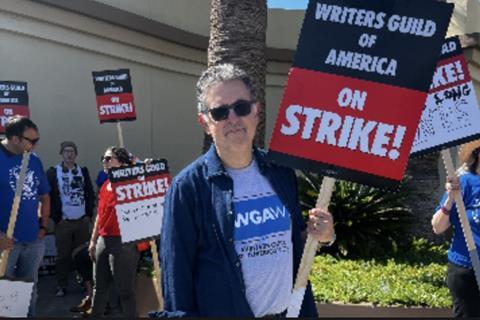
Picket lines stretched the length of street blocks on Tuesday (May 2) as striking Writers Guild Of America (WGA) members kicked off industrial action in Los Angeles and New York after six weeks of ill-fated contract negotiations with the studios, streamers and networks.
Writers in Hollywood picketed Netflix, Paramount Pictures and CBS Television City complex among others as they waved banners bearing legends like “Succession Without Writers Is Just The Apprentice” and “No Pages Without Fair Wages”. Passing drivers created at times a cacophonous backdrop as they honked horns in support.
Nobody knows how long Hollywood’s first writers strike in 15 years will last – the 2007-08 strike ran for 100 days – but as David Goodman, co-chair of WGA’s negotiating committee, told Screen outside the front gates of Paramount, “The union is united unlike any other time I have ever seen.”
After talks broke down on Monday (May 1) the WGA published a chart highlighting its demands for fair pay and other points and the responses from Alliance Of Motion Picture And Television Producers (AMPTP).
While negotiations yielded tentative agreements on issues like script fees and broadcast re-runs, the gap between the parties remains large. Both sides are far apart on resolving Guild calls for greater compensation for minimum pay, residuals, enhanced pension and health terms, staffing levels on writers’ rooms and so-called “mini-rooms”, and regulation of the use of artificial intelligence (A.I.)
A Guild proposal to establish a viewership-based streaming residual rewarding shows with greater viewership – in addition to existing fixed residuals – would require Hollywood companies to be transparent about their data. WGA said AMPTP rejected the proposal and did not make a counter.
In many cases WGA said AMPTP rejected its proposals and refused to make counter-offers. The WGA claims its proposals would bring writers approximately $429m more per year, while it said AMPTP’s offer would bring approximately $86m more per year. AMPTP declined to comment.
The WGA maintains the proliferation of streaming platforms has changed the game, bringing vast profits to Hollywood companies and media conglomerates but leaving members behind in terms of commensurate pay. ”Writers are facing the most comprehensive assault on compensation and working conditions that they have seen in a generation,” read a message on the Guild’s website. ”The studios have taken advantage of the transition to streaming to underpay entertainment industry workers, including writers in every area of work. Like too many working people across our economy, as corporate profits grow, writers are just not keeping up.”
Justine Bateman, the writer-director of 2021 TIFF and SXSW selection Violet starring Olivia Munn, stood outside Netflix with dozens of others and said: “This is about the devaluing of human skill, talent and effort.”

Bateman said the difference between May 2023 and the 2007-08 strike was that “we’re dealing with a lot more greed right now”. She noted that streamers and studios with streaming components have far more films and series than ever before and can find ways to keep consumers happy while the strike endures.
For their part, Hollywood companies have argued they are in a tight spot financially as they try to make up for the huge costs of building their streaming businesses and are in the midst of painful lay-offs.
Writers who spoke to Screen were having none of it.
“The last time we felt we were all in an ecosystem,” said feature writer Alan Sereboff. ”Now I feel it’s the creative community against the tech companies.
“Being in the midst of a project and having to put your pen down is difficult, but this has to happen. This is an existential issue.”
Bateman addressed A.I., a bone of contention among writers who talked of the prospect of having their creative roles greatly diminished.
“A.I. cannot automate art but it can automate content,” she said, referring to “content” as a soulless term used by streamers and big media executives to describe film and television.
Goodman, picketing outside Paramount, said, “In the short term A.I. isn’t that big a threat. But in the long term there’s the idea it may get to a place where it can generate a story document or script which is handed to a writer who’s told to rewrite it.
“That means that the value of the human writer gets reduced and the amount of what a writer earns gets reduced. We cannot have that.”

One TV writer outside Paramount who has written on Only Murders In The Building said of the breakdown in talks, “It felt like the studios were saying, ‘Fuck you’.”
Monday night’s strike call by the WGA spelled an immediate work stoppage for late night television shows, the daily shows which require writers every day.
Other shows which have been produced but have not yet aired will be broadcast, although future production cannot go ahead while the strike endures and re-runs will be deployed.
Reality TV, news, and sports are not impacted by the strike and will continue to air.
In film, all projects with locked scripts will proceed to production although it remains to be seen what happens when the filmmakers need to do rewrites. No WGA writer will be on set. Click here for WGA strike rules.
Both the Directors Guild of America (DGA) and SAG-AFTRA representing actors are due to start negotiating their contracts soon (May 10 and June 7, respectively). Both contracts expire on June 30.
SAG-AFTRA members attended Tuesday’s picket lines, waving banners. The Teamsters (which represents truck drivers and other professions and spans multiple sectors) will not cross any picket line, and IATSE (which represents some 140,000 below-the-line workers) and Producers Guild of America (PGA) have come out in support of the strike.
On Monday the PGA issued the following statement: “The Producers Guild of America stands with the Writers Guild as its members seek fair and equitable compensation for their work, making the difficult decision to strike in order to create meaningful change within our industry. We believe that everyone working in the film and television industry deserves to be fairly compensated for their work and receive essential benefits.”






![The Brightest SunScreen[Courtesy HKIFF]](https://d1nslcd7m2225b.cloudfront.net/Pictures/274x183/3/5/0/1448350_thebrightestsunscreencourtesyhkiff_312678.jpg)


















No comments yet